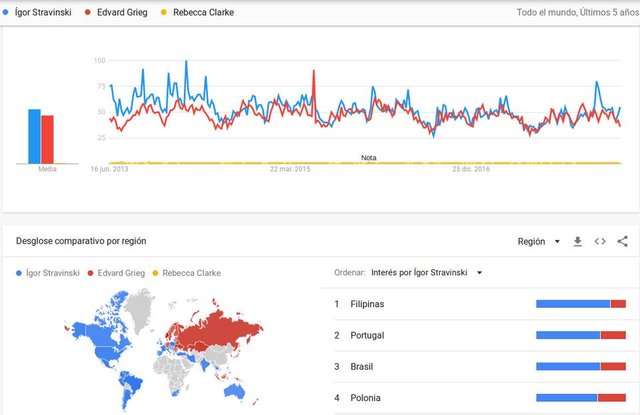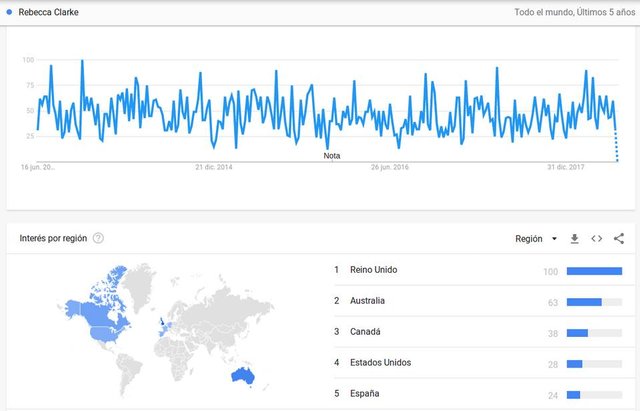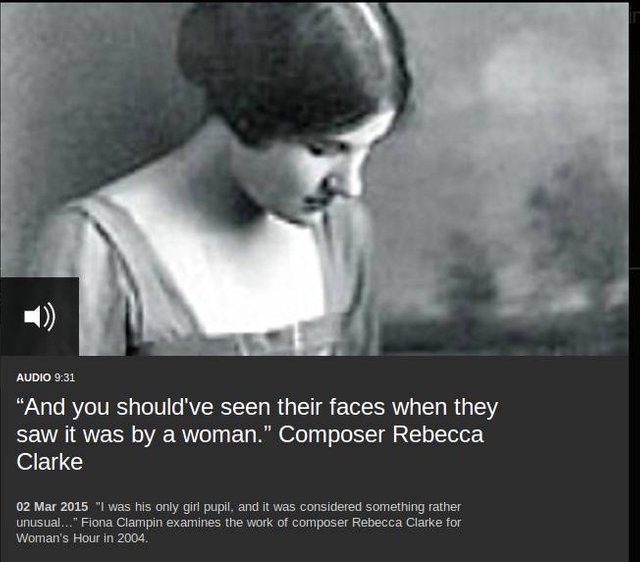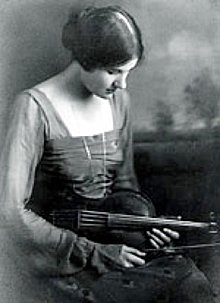Rebecca Clarke (Death and the Maiden) / (Morte e a Muller)
Rebecca Clarke (Unha flor antre os nabos)
Abstract
Rebeca Clarke has been described as the most distinguished British composer of the wars generation, raising a large volume of works [7] in which emphasize those of the period of 1920.
Resumo
Rebeca Clarke ten sido descrita por como a compositora británica máis distinguida da xeración de entreguerras, criando un nutrido volume de obras [7] nas que destacan as do periodo de 1920.
@classical-radio challenges us that we create a post with Igor Stravinsky, Rebecca Clarke or Evard Grieg.
I am glad that a woman appears within the list of chosen composers, and we are going to dedicate this post to her, but, as usual, not without first analyzing the popularity of the composers we have at hand.
@classical-radio retanos a que posteemos arredor de Igor Stravinsky, Rebecca Clarke o Evard Grieg.
No puedo por menos que alegrarme que una mujer aparezca dentro del listado, y a ella vamos a dedicar este post, pero, como habitualmente, no sin antes analizar la popularidad de los compositores que tenemos entre manos.

Rebeca Clarke's Google Search last 5 years

=== Rebecca Clarke ===

1886 August 27 Born

Rebecca Clarke was born in Harrow, England. The father had an interest in music, and I had to take violin lessons at nine years old.
Rebecca Clarke naceu en Harrow, Inglaterra. O pai tiña interese na música, e fixolle tomar clases de violín ós nove anos.
1903 Begins the studies of violin//Empeza os estudos de violín
He began studying at the Royal Academy of Music in 1903, but his father pulled from there in 1905 after the teacher asked for a marriage. (later he will leave a Stradivarius as a testament)
He was able to create a different approach from the violin and the viola, making the latter seen as a legitimate soloist instrument.[5]
Empezou a estudar na Royal Academy of Music no 1903, pero o pai tirouna de alí en 1905 logo de que o mestre pediralle matrimonio. (mais tarde deixarialle como testamento un Stradivarius)
Foi quen de criar un enfoque diferente do violín e da viola, chegando a facer que esta última fora vista como un instrumenot solista lexítimo.[5]
1910 Leaving paternal Home // O pai votouna da casa
After his criticism of his father's extramarital affair, he took her from the house and cut off her economic support. He had to leave the Royal College in 1910 and keep himself playing the viola. Clarke became one of the first women to be a professional musician in an orchestra. [3]
Logo das súas críticas polas relacións extramatrimoniais do seu pai, este botouna da casa e cortoulle o sustento económico. Tivo que deixar o Royal College en 1910 e manterse a si mesma tocando a viola. Clarke converteuse nunha das primeiras mulleres en ser músico profesional nunha orquestra.[3]
1916 Moving to NY // Mudase a Nova Iorque
In 1916 he moved to the United States to continue his career as an interpreter.
En 1916 trasladouse aos Estados Unidos para continuar a súa carreira como intérprete.
1918 Morpheus
A small and lyrical piece for viola and piano titled Morpheus, and composed under the pseudonym of "Anthony Trent", was released in its joint recital with the cellist May Muklé in 1918 in the city of New York.
The critics praised "Trent", and largely ignored the credits credited to Clarke released in the same recital.[3]
Unha pequena e lírica peza para viola e piano titulada Morpheus, e composta baixo o pseudónimo de "Anthony Trent", foi estreada no seu recital conxunto coa violonchelista May Muklé en 1918 na cidade de Nova York.[3]
1919 Sonata para Viola e piano
His career as a composer reached his peak in a short period of time, beginning with the sonata for viola that he presented to a 1919 contest sponsored by Elizabeth Sprague Coolidge, Clarke's neighbor and art patron.
Among a total of 72 participants, Clarke's sonata drew in the first position with a composition by Ernest Bloch.
Coolidge subsequently declared Bloch a winner.
The critics speculated that "Rebecca Clarke" was just a pseudonym of Bloch himself, or less could not have been Clarke who had written those pieces, with the idea that a woman could write a work was socially inconceivable. The sonata was well received and was performed for the first time at the Berkshire music festival in 1919.[3]
Debussy's coetanea, his impressionism is often mentioned in relation to Clarke's work, particularly its exuberant textures and modernist harmonies. The Sonata for viola exemplifies this with its initial pentatonic theme, thick harmonies, its emotionally intense nature, and its densely and rhetorically complex textures.[3]
... the idea that a woman could write a work was socially inconceivable ......
A súa carreira como compositora acadou o seu punto máximo nun breve período de tempo, comezando coa sonata para viola que presentou a un concurso en 1919 patrocinado por Elizabeth Sprague Coolidge, a veciña de Clarke e mecenas das artes.
Entre un total de 72 participantes, a sonata de Clarke empatou na primeira posición cunha composición de Ernest Bloch.
Coolidge posteriormente declarou gañador a Bloch.
Os críticos especularon con que "Rebecca Clarke" era só un pseudónimo do propio Bloch, ou canto menos que non podía ter sido Clarke a que escribira esas pezas, coa idea de que unha muller puidera escribir unha obra era socialmente inconcibible. A sonata foi ben recibida e foi interpretada por primeira vez no festival de música de Berkshire en 1919.[3]
O impresionismo do eu coetaneo Debussy é frecuentemente mencionado en relación coa obra de Clarke, particularmente as súas texturas exuberantes e harmonías modernistas. A Sonata para viola exemplifica isto co seu tema pentatónico inicial, espesas harmonías, a súa natureza emocionalmente intensa, e as súas texturas densas e ritmicamente complexas [3]
... a idea de que unha muller puidera escribir unha obra era socialmente inconcebible...
1921: Trio with piano
In 1921 Clarke returned to make an impressive show in the contest of composition of Coolidge with his trio with piano, although once again could not take the prize.[3]
In 1921 Clarke returned to make an impressive show in the contest of composition of Coolidge with his trio with piano, although once again could not take the prize.[3]
1921 Chinese Puzzle
Rebecca Clarke has been characterized by composing many small pieces, from amongst my poor little ears enjoyed this small Chinese Puzzle
Rebecca Clarke caracterizouse por compoñer moitas pequenas pezas, de entre as cais, o meu pobre oido, disfrutou con este Puzzle Chino. ,-)
1940: Passacaglia on an Old English Tune
This composition was contributed by @ gussiefinknottle as soon as the challenge was published. I believe by the speed and the intensity of the comment that has it very present:
@gussiefinknottle: _As with the much more famous Fantasia by Vaughan Williams, the “old tune” of the title is attributed to Thomas Tallis. Exploiting the viola’s rich, veiled timbre to the full, the piece begins in sombre, restrained style but becomes more impassioned as it unfolds. It deserves to be better known, in my opinion.-
Esta composción foi aportada por @gussiefinknottle nada mais publicarse o reto. Coido que pola paixon que deposita no comentario, este está para el moi presente:
@gussiefinknottle: La "vieja canción" del título se atribuye a Thomas Tallis. Explotando al máximo el rico y velado timbre de la viola, la pieza comienza con un estilo sombrío y moderado, pero se vuelve más apasionada a medida que se desarrolla. Merece ser mejor conocido, en mi opinión.
1941: Prelude, Allegro and Pastorale (1941)
With the outbreak of World War II, Rebecca, who was in the U.S. visiting the family, could not get a visa to return to Great Britain. She spent some time with her family, and then found work as a governess for a family in Connecticut.
This work, corresponding to this time, has neoclassical influence, written for clarinet and viola (originally for his brother and his sister-in-law
Co estourido da Segunda Guerra Mundial, Rebecca, que estaba nos E.U.A visitando á familia non pudo conseguir unha visa para regresar a Gran Bretaña.Viviu un tempo coa familila, e logo atopou traballo como institutriz para unha familia en Connecticut.
Esta obra, correspondente a esta época, ten influencia neoclásica, escrita para clarinete e viola (orixinalmente para o seu irmán e a súa cuñada)[3]
1944: Gets married and stops composing // Casa e abandoa a composición
2000: The Rebecca Clarke Society was established
Founded by musicologists Liane Curtis and Jessie Ann Owens and based in the Women's Studies Research Center at Brandeis University, the Society has promoted recording and scholarship of Clarke's work, including several world premiere performances, recordings of unpublished material, and numerous journal publications.
Fundada polos musicólogos Liane Curtis e Jessie Ann Owens e con sede no Centro de Investigación sobre Estudos de Muller na Universidade de Brandeis, a Sociedade promoveu a gravación e bolsa do traballo de Clarke, incluíndo varias presentacións de estrea mundial, gravacións de material inéditos e numerosas publicacións de revistas.
2002: “Death and the Maiden” CD Released
This CD includes two string quartets... by Rebecca Clarke.
Poem for String Quartet - Camilli String Quartet
and Morpheus
but... why is this CD entitled “Death and the Maiden” ??
It might be argued that there is no larger meaning for employing the name of Schubert’s Quartet for the whole CD. Another possibility finds rich significance in this choice of title. “Death and the Maiden” is followed by two “Dead Maidens,” Fanny Mendelssohn and Clarke — “dead” not only literally, but also (for so many decades) figuratively, as their music lay completely forgotten.
Fanny Mendelssohn and Clarke might be paralleled in many ways, most notably in their reception history. Both published only a small part of their repertoire during their lifetimes, and the remainder has remained completely hidden from view until recent years (and in both cases, the materials have been difficult to access, as they have been held uncatalogued and in the private control of obscure family members). The 1980 New Grove Dictionary article on Clarke, notoriously dismissive with its single sentence, can be compared with Fanny Mendelssohn’s from the same Dictionary: her music is assumed (without being seen or heard) to be of little worth. It took the interest generated by the woman’s movement and its resulting feminist scholarship to begin the process of bringing these “Dead Maidens” to life.
It is worth observing that this service to “Dead Maidens” is offered by an all-female ensemble. It is one of a number of examples of such a group feeling a special connection for their musical sisters of previous generations — although I am certain that male and mixed ensembles would like to play Clarke’s music for string quartet, too, if only it were available! [editor’s note: the Poem was published, in 2004, as one of the “Two Movements for String Quartet” (Oxford University Press). Unfortunately it is not titled Poem, only “Adagio.”]
Source REbecca Clarke Socyety
pero, por qué este CD intitulase “Death and the Maiden” (a morte e a muller)??
Pódese argumentar que non hai maior significado para empregar o nome do Cuarteto de Schubert para o CD completo.
Outra posibilidade atopa unha significativa transcendencia nesta elección do título. "Death and the Maiden" é seguida por dúas "Dames Mortas", Fanny Mendelssohn e Clarke - "mortas" non só literalmente, senón tamén (por tantas décadas) figurativamente, xa que a súa música estaba completamente esquecida.
Fanny Mendelssohn e Clarke poden estar en paralelo en moitos sentidos, sobre todo na súa historia de recepción. Ambas publicaron só unha pequena parte do seu repertorio durante a súa vida, e o resto quedou completamente oculto ata os últimos anos (e, en ambos casos, os materiais foron difíciles de acceder, xa que se mantiveron sen catalogar e no control privado de membros de familias escuras).
O artigo do New Grove Dictionary de 1980 sobre Clarke, notablemente despectivo coa súa única redacción, pódese comparar con Fanny Mendelssohn do mesmo Dicionario: a súa música é asumida (sen ser vista ou escoitada) para valer a pena.
Isto despertou o interese do movemento das mulleres que coa creación da bolsa de Traballo "Rebecca Clarke" escomenzou o procesoo de achegar a estas "Mulleres Mortas" á vida.
Paga a pena observar que este servizo para "Dead Maidens" é ofrecido por un conxunto feminino. É un dos numerosos exemplos deste grupo de sensación dunha conexión especial para as súas irmás musicais das xeracións anteriores.
[Nota do Editor: O poema foi publicado no 2004 como un dos dous movementos para Quarteto de Cordas.(Oxford University Press). Lamentablemente non está intitulado como "Poema", senon só adagio.]
Source Rebecca Clarke Socyety
Webgrafía e sites de interés
• [1] Rebecca Clarke society
• [2] Rebecca Clarke's FB page
• [3] Rebecca Clarke Wiki [Gal]
• [4] Rebecca Clarke Wikipedia English
• [5] Rebecca Clarke -Wiki-ES
More in Depth
• [6] The Rebecca Clarke Society Newsletter 2004 Vol. 4 (PDF)
• [7] Wiki (En) List of Compositions by Rebecca Clarke
Thanks a lot for stand and reading.
Obrigado pola compaña, o calor e os comentarios.
Apertas dende lonxe !!!
Wow, you know much more about Clarke now than I ever did! I only really knew the viola Sonata!
Resteemed, your post will appear in the next curation with a SBD share for you!
Your post has been supported and upvoted from the Classical Music community on Steemit as it appears to be of interest to our community. You can find details about us below.

The classical music community at #classical-music and Discord.
Follow our community accounts @classical-music and @classical-radio.
Follow our curation trail (classical-radio) at SteemAuto or help us out with a delegation!
This post should be titled...
How to become an expert in Rebecca Clarke in a week starting from scratch with @ classical-music (with some small help from youtube and wikipedia)
This post was shared in the Curation Collective Discord community for curators, and upvoted and resteemed by the @c-squared community account after manual review.
Thanks a lot.
I registered in the channel of disagreement to know better.
Regards.